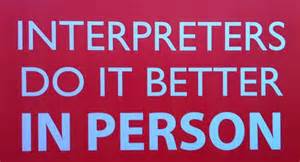
Moving Toward a More Professional Interpreting Industry
Michelle Scott, a Registered Nurse and interpreter trainer, discusses ways in which the medical interpreting profession can “catch up” with other healthcare professions.

Michelle Scott, a Registered Nurse and interpreter trainer, discusses ways in which the medical interpreting profession can “catch up” with other healthcare professions.

Across the age spectrum, from infants to teens, nurse practitioner Hoda Shawky discusses her communication strategies with patients and parents. Immunizations and common pediatric health problems are reviewed.

VoicesACADEMY is pleased to provide RID credits through our CMP sponsor, CEUs on the Go! Follow the instructions below in order to earn RID credit. NOTE: Only sign language interpreters must submit a PINRA form. BEFORE watching the video, complete the PINRA form: Click here to download the PINRA form. Complete only the …Continue Reading
Professional conferences offer an excellent opportunity to learn and network! It’s an exciting time to interact with old friends and make new ones. Presenters come from near and far to share pearls of wisdom. Exhibitors provide glimpses of new solutions and job opportunities. As a freelance interpreter or translator, how can you prepare in advance …Continue Reading

Originally a medical conference interpreter in Brazil, trainer Marcelle Castro describes her academic research about using technology to train interpreters, often internationally. Her experience is applicable to the field of medical interpreter training, as she describes considerations for learning styles, trainer adaptations and various resources (software, hardware and web based).

Interpreters can improve facilitation of communication for medical histories by understanding providers’ goals, communication styles, and different types of histories. Concepts presented by Michelle Scott, RN include the S.O.A.P. process, pain assessment, the 5 components of a medical history, communication techniques and styles, and patient reactions.

This interview with Shane Feldman, RID Executive Director, explores topics related to providing adequate healthcare services to Deaf patients, including an explanation ASL certification and a comparison of live versus video remote interpreters.

Registered Dietician Debra Hook explains special considerations for communicating with patients when providing nutrition counseling in outpatient settings. Particular attention is given to the culture brokering role of the medical interpreter with regard to foods and their preparation. The corresponding online “Nutrition” medical glossary contains 110 terms.

In this interview, Registered Nurse Ron Coronado describes the emergency department setting from triage to discharge. Practical tips for medical interpreters are provided for good communication, preparation, and managing dilemmas.

In this interview, Dr. Maryam Rahimi describes the role of an internal medicine physician, common chronic conditions encountered in outpatient clinical settings (diabetes, hypertension and heart disease) and practical tips for interpreters.

This interview with Lynne Carter, Head of Equality and Diversity at NHS Bradford and Airedale, provides an introduction to health disparities in the United Kingdom, as well as strategies to address language accommodation, allowing the audience to compare opportunities within the U.S. healthcare system.

Gloria Guzman, WA-DSHS certified medical interpreter, shares personal experiences as a professional medical interpreter to highlight cultural and linguistic dilemmas that are common among Spanish interpreters.

Ron Coronado, RN discusses the healthcare provider’s approach to taking sexual histories and providing sex education. Sexually transmitted diseases, social stigma and interpreting ethics are addressed. The corresponding glossary contains over 60 medical terms.
“Send a Dinka interpreter right away. I don’t care if they’re trained, I just need a warm body!” Believe it or not, this was an actual request to our language agency by a hospital nurse administrator ten years ago. If you are a language agency owner or an interpreting services coordinator who has cringed at …Continue Reading
Yes, I’ve heard the reasons given by interpreters for not wanting or getting training, whether we’re talking core concepts or continuing education. Let me get this out of my system now: “Blah, blah, blah…” Here are a few well-known excuses, as well as my responses: “Medical interpreter training is too expensive.” – Medical interpreters typically …Continue Reading
“I’ve been interpreting in hospitals for 20 years. I don’t need training!” As the owner of a language agency, I can’t tell you how many times I’ve heard that claim. Perhaps you have even said it yourself. For me, that statement is a RED FLAG: an interpreter with this attitude is at the top of …Continue Reading

As a professional nurse and medical interpreter, author Ineke Crezee describes results of research exploring vicarious trauma experienced by interpreters working with refugees. Concepts are applicable to interpreters working with refugees in any country.